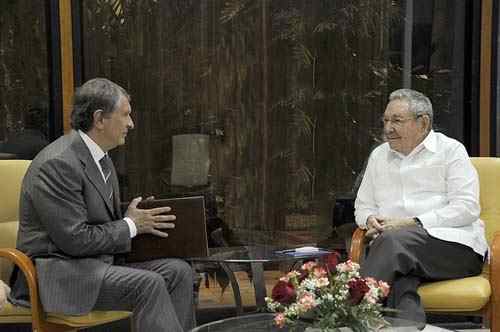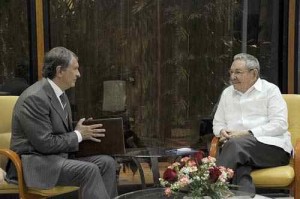
Castro welcomes Russia’s top oil exec
A clue to the significance Cuba attaches to its relationship with Russia was given Sat. 23, when President Raúl Castro met in Havana with Igor Ivanovich Sechin, chief executive officer of the Russian energy giant Rosneft, who headed a Russian trade delegation to Havana.

The meeting was reported Mon. 25 atop Page One of the official daily Granma, with a picture of the two men meeting. Other Cuban media gave prominent display to the news item.
According to Granma, “both parties dialogued on their common desire to continue to improve relations in sectors such as hydrocarbons, health care, tourism, energy and the training of specialists in the oil industry.”
They also talked about “the updating of the Cuban economic model, the process of regional integration and the possibilities for future investments offered by the Special Development Zone in Mariel.”
Also present at the meeting were Boris Kovalchuck, chairman of the board of Inter-RAO, a major Russian energy conglomerate, and Mikhail Kamynin, Russia’s Ambassador to Cuba.
Rosneft, Russia’s largest oil producer, appears to be very interested in the possibilities offered by Latin American countries. Bloomberg News reported earlier this month that Rosneft plans to invest $13 billion in five projects in Venezuela over the next five years and buy at least part of Lukoil’s stake in a producing oil field in the Orinoco Oil Belt.
Lukoil is Russia’s second-largest oil producer.
Rosneft also has been in talks with the government of Ecuador over plans to develop that country’s hydrocarbon resources, the Kremlin announced in October. According to BP statistics, Ecuador has proven oil reserves of 8 billion barrels, less than 1 percent of the world’s total. Venezuela has proven oil reserves of almost 300 billion barrels.
And earlier this month, Rosneft signed a memorandum of understanding with Bolivia to explore for and develop energy in that Andean country.
The Russian oil company Zarubezhneft explored potential oil fields off the coast of Cuba last year but suspended them in May of this year for technical reasons. The company said it will resume its exploration in 2014 at a spot near Cayo Santa MarÌa, east of Havana. Cuba receives most of its oil from Venezuela.

